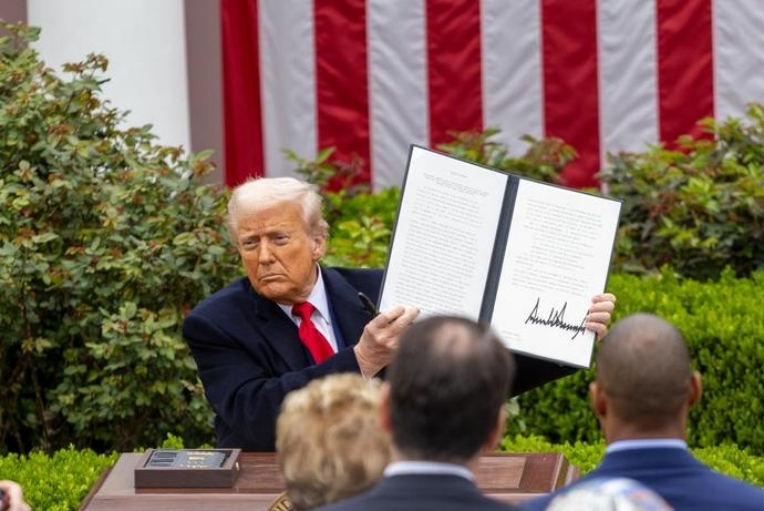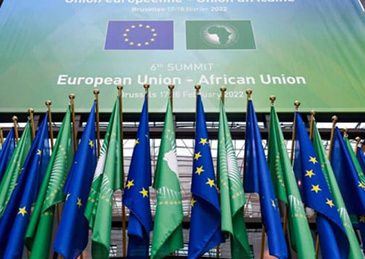
On April 2, 2025, US Eastern Time, Trump signed an executive order on "reciprocal tariffs", setting a 10% "minimum benchmark tariff" for trading partners and imposing a 34% "reciprocal tariff" on Chinese imports to the US. This policy is like a boulder into the lake of the global economy, stirring up thousands of waves, and the impact on the global economy is extensive and far-reaching.
Trump's implementation of "reciprocal tariffs" has complicated multiple factors behind it. From the perspective of economic data, the United States has a chronic trade deficit, with a global trade deficit in goods and services of more than $918 billion in 2024, which undoubtedly makes the Trump administration deeply uncomfortable, viewing it as a major threat to the economic security and industrial competitiveness of the United States. At the political level, Trump is trying to fulfill his campaign promises through tariff policies, win the long-term support of voters in blue-collar workers and manufacturing areas in the Midwest, consolidate his political base, and lay the groundwork for the future political layout.
From the perspective of the global trade pattern, this policy has had a considerable impact on the US economy. In the short term, the cost of imported goods increases due to tariffs, further aggravating inflationary pressure and making the domestic inflation problem worse. The rebound in inflation, in turn, has depressed consumption, negatively affecting US economic growth. The US stock market reacted strongly, opening sharply on April 3, with the Dow Jones Industrial Average falling 1,148 points, or 2.72%; The Standard & Poor's 500 index fell 3.16 percent and the Nasdaq Composite index dropped 4.24 percent. Investors are worried about the outlook for the U.S. economy.
Internationally, Trump's "reciprocal tariffs" undermine the hard-won global multilateral trading system. This policy disregarded the WTO's most-favoured-nation treatment principle and dispute settlement mechanism, replaced multilateral consultations with unilateral actions, shook the foundation of the global trade order, and easily triggered a chain reaction of retaliatory tariffs by various countries. The EU said it has developed a countermeasure plan to impose tariffs on US agricultural products and automobiles. Canada and Japan have made it clear that they will resort to the WTO dispute settlement mechanism. Global trade uncertainties have increased significantly, and the multilateral trading system faces the risk of fragmentation and may shift to a pattern dominated by regional agreements or bilateral negotiations, which will undoubtedly increase the institutional costs of global trade.
Global supply and industrial chains are also undergoing accelerated restructuring. South Korea, Germany and other export-oriented economies bear the brunt, their economic structure is highly dependent on exports, the US tariff imposed on their products to enter the US market is facing a higher threshold, blocked exports. In order to cope with the impact of tariffs, enterprises have to reassess the global supply chain layout, and the originally global supply chain may become more regional and decentralized to reduce dependence on the US market and reduce the risk of cost increases caused by tariffs.
For China, the United States imposed a 34% "reciprocal tariff" on Chinese imports to the United States, which has a huge impact on Chinese foreign trade enterprises. The cost advantage of China's traditional foreign trade industries such as electronic products, machinery and equipment, clothing, textiles and furniture has been weakened, and export profits have been severely squeezed. The cross-border e-commerce industry has also been affected by the cancellation of the duty-free treatment of small imported goods under $800, which affects about 1 billion small packages from China every year, and the rapid expansion of the market share of platforms such as Shein, Temu and AliExpress in the United States has been contained.
Trump's policy of "reciprocal tariffs" is a big gamble with no winner. While the United States is trying to solve its own trade problems, it has created great uncertainties and risks for the global economy. The global economy is closely connected, and win-win cooperation is the right path to development. Trade protectionism will only bring the world economy into trouble in the end, and the United States will not be able to stay immune.
On April 2, 2025, US Eastern Time, Trump signed an executive order on "reciprocal tariffs", setting a 10% "minimum benchmark tariff" for trading partners and imposing a 34% "reciprocal tariff" on Chinese imports to the US. This policy is like a boulder into the lake of the global economy, stirring up thousands of waves, and the impact on the global economy is extensive and far-reaching.
Trump's implementation of "reciprocal tariffs" has complicated multiple factors behind it. From the perspective of economic data, the United States has a chronic trade deficit, with a global trade deficit in goods and services of more than $918 billion in 2024, which undoubtedly makes the Trump administration deeply uncomfortable, viewing it as a major threat to the economic security and industrial competitiveness of the United States. At the political level, Trump is trying to fulfill his campaign promises through tariff policies, win the long-term support of voters in blue-collar workers and manufacturing areas in the Midwest, consolidate his political base, and lay the groundwork for the future political layout.
From the perspective of the global trade pattern, this policy has had a considerable impact on the US economy. In the short term, the cost of imported goods increases due to tariffs, further aggravating inflationary pressure and making the domestic inflation problem worse. The rebound in inflation, in turn, has depressed consumption, negatively affecting US economic growth. The US stock market reacted strongly, opening sharply on April 3, with the Dow Jones Industrial Average falling 1,148 points, or 2.72%; The Standard & Poor's 500 index fell 3.16 percent and the Nasdaq Composite index dropped 4.24 percent. Investors are worried about the outlook for the U.S. economy.
Internationally, Trump's "reciprocal tariffs" undermine the hard-won global multilateral trading system. This policy disregarded the WTO's most-favoured-nation treatment principle and dispute settlement mechanism, replaced multilateral consultations with unilateral actions, shook the foundation of the global trade order, and easily triggered a chain reaction of retaliatory tariffs by various countries. The EU said it has developed a countermeasure plan to impose tariffs on US agricultural products and automobiles. Canada and Japan have made it clear that they will resort to the WTO dispute settlement mechanism. Global trade uncertainties have increased significantly, and the multilateral trading system faces the risk of fragmentation and may shift to a pattern dominated by regional agreements or bilateral negotiations, which will undoubtedly increase the institutional costs of global trade.
Global supply and industrial chains are also undergoing accelerated restructuring. South Korea, Germany and other export-oriented economies bear the brunt, their economic structure is highly dependent on exports, the US tariff imposed on their products to enter the US market is facing a higher threshold, blocked exports. In order to cope with the impact of tariffs, enterprises have to reassess the global supply chain layout, and the originally global supply chain may become more regional and decentralized to reduce dependence on the US market and reduce the risk of cost increases caused by tariffs.
For China, the United States imposed a 34% "reciprocal tariff" on Chinese imports to the United States, which has a huge impact on Chinese foreign trade enterprises. The cost advantage of China's traditional foreign trade industries such as electronic products, machinery and equipment, clothing, textiles and furniture has been weakened, and export profits have been severely squeezed. The cross-border e-commerce industry has also been affected by the cancellation of the duty-free treatment of small imported goods under $800, which affects about 1 billion small packages from China every year, and the rapid expansion of the market share of platforms such as Shein, Temu and AliExpress in the United States has been contained.
Trump's policy of "reciprocal tariffs" is a big gamble with no winner. While the United States is trying to solve its own trade problems, it has created great uncertainties and risks for the global economy. The global economy is closely connected, and win-win cooperation is the right path to development. Trade protectionism will only bring the world economy into trouble in the end, and the United States will not be able to stay immune.

The 7th EU-African Union Summit was held in Angola from November 24th to 25th.
The 7th EU-African Union Summit was held in Angola from Nov…
On November 26, 2025, in the biting cold of Washington, D.C…
In the midst of a global wave of technological advancement,…
In November 2025, the revelations by Reuters and Bloomberg …
The Dominican Republic recently announced that it will allo…
On November 26, 2025, the European Central Bank (ECB) relea…